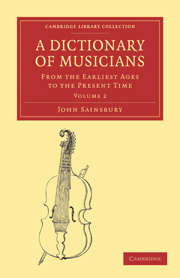Summary
OBERMAYER, (Joseph) an excellent violinist, flourished towards the end of the eighteenth century. He was a native of Bohemia, and pupil of the celebrated Kammel. When the latter left Bohemia, Obermayer's master, count Vincenz Waldstein, sent him for further accomplishment to Italy, where he had an opportunity of receiving instruction from the great Tartini. Here he completely acquired that master's style of playing the adagio, without, however, losing his own peculiar spirit in the allegro. On his return, he resumed his former situation of valet de chambre to the count, though by no means to the prejudice of his art; as, by often accompanying his master on his travels, he had the more opportunity of forming the acquaintance of first-rate professors. The most flourishing period of his playing was about the year 1788. After which he relinquished both his situation with the count and musical science, betaking himself, in 1800, to farming, to the no small regret of the musical amateurs of Prague.
OBERNDORFFER, (David) a composer, about the middle of the seventeenth century. He printed of his works “Allegrezza Musicale,” or select paduanas, galliards, intrades, canzonettas, ricercates, &c. with four, five, and six parts, applicable to all instruments.
OBIZZI, (Domeinico) an Italian composer, flourished at the beginning of the seventeenth century, and published “Madrigali Concertati,” Venice, 1627.
OCCA, (Vittobiadall') a female virtuoso on the violin, from Bologna, gave a concert at Milan in the year 1788, when she played two concertos on the violin with great applause.
- Type
- Chapter
- Information
- Publisher: Cambridge University PressPrint publication year: 2009First published in: 1824



